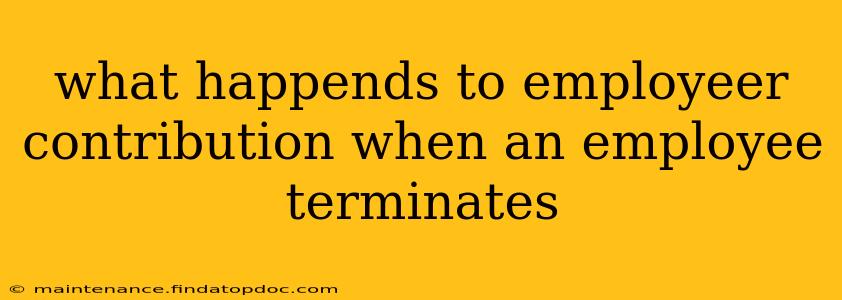What Happens to Employer Contributions When an Employee Terminates?
The fate of employer contributions to retirement plans, health savings accounts (HSAs), or other benefits upon employee termination depends heavily on the specific plan, company policy, and the reason for termination. There's no single, universally applicable answer. Let's break down the most common scenarios:
401(k) and Other Retirement Plans:
Employer matching contributions, unlike employee contributions, are typically vested over time. Vesting refers to the point at which the employer's contributions become the employee's property, regardless of employment status. Vesting schedules vary, but common schedules include:
- Immediate vesting: The employer's contributions are immediately vested. The employee owns them from day one.
- Graded vesting: The employer's contributions vest gradually over a period, such as three to six years. For example, a common schedule is 20% vested after two years, 40% after three, and fully vested after six.
- Cliff vesting: The employer's contributions vest completely after a certain number of years (e.g., three or five years). Before that point, the employee owns nothing.
If the employee leaves before vesting is complete: They forfeit the unvested portion of the employer's matching contributions. The vested portion remains in their account.
If the employee leaves after vesting is complete: They retain full ownership of both their contributions and the employer's matching contributions. They can generally roll this money over to an IRA or another qualified retirement plan.
Health Savings Accounts (HSAs):
Employer contributions to HSAs generally belong to the employee regardless of employment status. Termination of employment doesn't change ownership of funds already in the HSA. The employee retains control and can continue to use the funds for qualified medical expenses.
Other Benefits:
Other employer-sponsored benefits, such as paid time off (PTO), bonuses, and stock options, often have different rules based on company policy and employment agreements.
- Paid Time Off (PTO): Unused PTO may or may not be paid out upon termination. This is typically outlined in the employee handbook or employment contract. Some companies pay out accrued PTO, while others do not.
- Bonuses: Bonuses are usually paid only if the employee meets the conditions specified in the bonus plan. If the conditions are met before termination, the bonus is typically paid. If the conditions are not met, the bonus will not be paid.
- Stock Options: The rules regarding stock options upon termination vary significantly. Some plans allow the employee to exercise options after termination, while others have strict deadlines. The specifics are detailed in the stock option agreement.
What if the Termination is for Cause?
Company policy may vary when termination is due to employee misconduct or gross negligence. In some cases, unvested employer contributions might be forfeited entirely. Always consult your employer's handbook or employment agreement for clarification.
What if the Employee is Laid Off or Fired (Without Cause)?
In most cases, vested employer contributions remain with the employee, whether or not the termination was voluntary or involuntary. However, the unvested portions remain with the company.
How to Find Out Your Company's Policy?
The best way to understand your specific situation is to:
- Review your employee handbook: This document usually details the company's policies regarding benefits upon termination.
- Check your benefit plan documents: This includes 401(k) plan documents, HSA agreements, and any other relevant paperwork.
- Contact your HR department: If you have any questions or uncertainties, your HR department can provide clarification and specific details.
Understanding your company's policy regarding employer contributions upon termination is crucial to protecting your financial future. Don't hesitate to seek clarification if needed.
